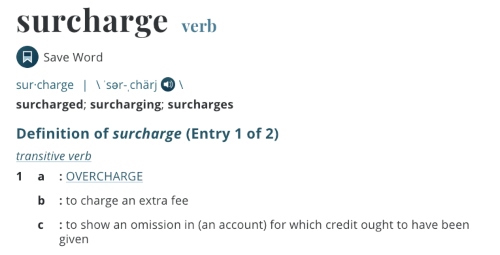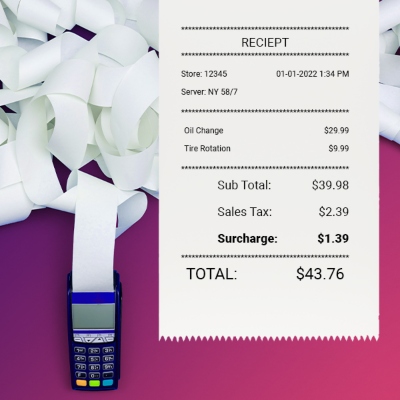What Credit Card Surcharging Means (in Plain English)

Credit card surcharging.
What is it? How does it work? Should you use it?
For those who are just discovering the world of credit card surcharging, rest assured that you’re not alone.
According to a recent survey of small business micro-merchants in the U.S., only 58% of small business merchants know of or clearly understand surcharging.
So first order of business, let’s define it.
What is Credit Card Surcharging?
We’ll give you two definitions: that listed in Merriam-Webster’s Dictionary and our depiction.

1(a) OVERCHARGE (b) to charge an extra charge (c) to show an omission in (an account) for which credit ought to have been given
CardX Definition:
Surcharge (verb)
1(a) fee customers pay to use credit cards (b) a method of enabling transparent pricing (c) a fair way of transacting with credit cards
Now that we’ve defined the term in (plain) English, let’s examine the nuts and bolts of surcharging:
How Does Surcharging Work?

In our words, surcharging occurs “at the time of purchase, [the merchant] informs the customer of the fee amount, and always gives the option to pay with a no-fee method.”
“Use it in a sentence,” you say? Ok, from the merchant’s perspective: “I use surcharging to avoid paying the bank a fee every time my customers pay with a credit card.”
From the customer’s perspective, they see one line item on their credit card statement, which depicts the word “surcharge” alongside a fee from the merchant that is not to exceed 4% of the subtotal. The surcharge is then paid to the card issuer as a cost for processing credit transactions.
Long story short, credit card companies pocket the surcharge (also commonly referred to as “interchange fee”). Merchants who don’t employ surcharging end up paying the credit card issuer directly to cover the cost of processing.
Why Does Surcharging Exist?
Credit or debit? It all starts there.
Your business likely offers multiple payment options to the customer, right?
That’s why credit card surcharging shouldn’t be confused with debit card processing, as credit card companies limit surcharging to credit cards only.
This is important because it is vastly more expensive for merchants to process credit card transactions than it is to run debit.
Regulated or “big” banks don’t charge more than 0.05% plus 21 cents per debit card transaction. This type of interchange fee is less costly yet unavoidable. As CardX CEO Jonathan Razi smartly puts it: “Unless you’re Walmart or Amazon, you cannot negotiate interchange [fees].”
In other words, if a customer pays with debit, you’re paying the interchange fee; there’s no way around it. Fortunately, the same rules do not apply to credit card transactions.
Common Reasons Merchants Avoid Surcharging

Many merchants avoid surcharging because they:
A) don’t know it exists. B) don’t have a clear understanding. C) don’t know if it’s legal in their state. D) are unsure of the impact on the customer experience.
We already discussed the unfortunate lack of awareness and/or understanding surrounding surcharging, but what about credit card surcharge law?
Merchants often ask us, “what states can do credit card surcharging?”
The answer is you can legally pass off the fee to the customer in 48 U.S. states (see: an explainer on credit card surcharge law). Put simply, surcharging is legal where you live unless that happens to be Connecticut or Massachusetts.
And the customer experience?
According to the results of a U.S. study of 2500 cardholders, nearly 60% of consumers said they’d “not pay surcharges at all” if presented with a fee. The truth is 85% of those respondents actually paid a surcharge without switching to a different payment method.
Surcharging saves merchants money without compromising the incentive of paying with credit (i.e., rewards, offers, bonuses).
(Note: The average credit card processing fee in the U.S. ranges from 1.70% – 2.05% for Visa, Mastercard, and Discover)
CardX: A fully compliant, turn key credit card surcharging.
Our parting words of wisdom? If surcharging sounds like it may be exploring for your business, let the experts guide your path.
Just as you’d trust a plumber to repair a busted pipe, an account to do your taxes, or a mechanic to fix your radiator, you should trust the leader in seamless surcharging compliance to help you accept credit cards at 0% cost.
CardX’s automated surcharging solution helps business owners avoid credit card processing fees without the headache of complying with state laws or credit card brand rules.
